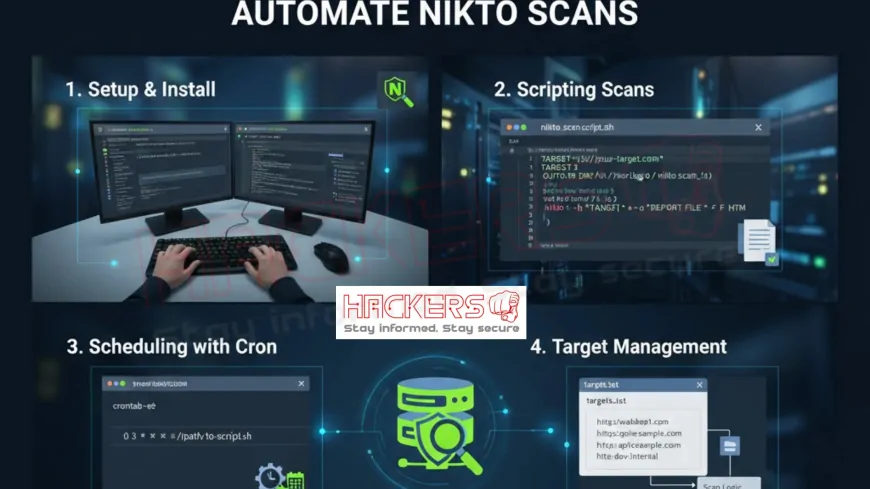How to Automate Nikto Scans for Continuous Security Testing
Security isn’t a one-time checkbox. It’s a habit. And in 2025, the best security teams don’t remember to scan their servers. They make scanning happen automatically, every day, every deploy, every time code changes. That’s where Nikto and automation come together to create a powerful, hands-free defense system. Imagine waking up to a Slack message: “Nikto found a new phpinfo.php file on staging. Fixed in 3 minutes.” Or a CI/CD pipeline that blocks a deployment because a server banner leak was detected. This isn’t science fiction. It’s what automated Nikto scanning delivers. In this comprehensive guide, you’ll learn how to turn Nikto from a manual tool into a fully automated security guard. We’ll cover cron jobs, GitHub Actions, Docker, Slack alerts, and more. No prior DevOps experience needed. By the end, you’ll have a complete system that scans, reports, and reacts, all without lifting a finger.

Table of Contents
- Why Automate Nikto Scans?
- Prerequisites: What You Need
- Method 1: Cron Jobs (Simple & Reliable)
- Method 2: GitHub Actions (CI/CD Integration)
- Method 3: Docker + Watchtower (Containerized)
- Method 4: Jenkins Pipeline (Enterprise)
- Sending Alerts: Slack, Email, and Webhooks
- Storing Results: HTML, JSON, and Databases
- Automation Methods: Comparison Table
- Best Practices for Reliable Automation
- Troubleshooting Common Issues
- Conclusion: Security That Never Sleeps
Why Automate Nikto Scans?
Manual scanning is like locking your door only when you remember. Automation locks it every time.
Key benefits:
- Catch issues early: Find
.envfiles before they go live. - Reduce human error: No more “I forgot to scan staging.”
- Meet compliance: Prove daily scans for PCI, SOC 2, ISO 27001.
- Scale easily: Scan 10 or 1,000 servers with the same effort.
- React fast: Get alerts the moment a vulnerability appears.
Prerequisites: What You Need
Before automating, make sure you have:
- A Linux server or VM (Ubuntu, CentOS, etc.)
- Nikto installed (
sudo apt install niktoor from GitHub) - A list of target URLs or IPs to scan
- Basic command-line knowledge
- Optional: Docker, GitHub, Slack, or email setup
Pro tip: Create a dedicated nikto-scanner user with limited permissions. Never run scans as root unless necessary.
Method 1: Cron Jobs (Simple & Reliable)
The easiest way to automate Nikto is with cron, Linux’s built-in scheduler.
Step-by-step:
- Create a scan script:
#!/bin/bash
TARGET="https://your-site.com"
OUTPUT="/var/scans/nikto-$(date +%Y%m%d-%H%M).html"
nikto -h $TARGET -o $OUTPUT -Format html
echo "Scan completed: $OUTPUT"- Save as
/home/nikto-scanner/daily-scan.shand make executable:
chmod +x /home/nikto-scanner/daily-scan.sh- Add to crontab (
crontab -e):
0 3 * * * /home/nikto-scanner/daily-scan.sh >> /var/log/nikto-scan.log 2>&1This runs daily at 3 AM. Reports are saved with timestamps.
Method 2: GitHub Actions (CI/CD Integration)
Perfect for developers. Scan every time code is pushed.
Create .github/workflows/nikto-scan.yml:
name: Nikto Security Scan
on:
push:
branches: [ main, staging ]
schedule:
- cron: '0 2 * * *' # Daily at 2 AM UTC
jobs:
scan:
runs-on: ubuntu-latest
steps:
- name: Install Nikto
run: sudo apt update && sudo apt install -y nikto
- name: Run Nikto Scan
run: |
nikto -h https://your-site.com -o report.html -Format html
- name: Upload Report
uses: actions/upload-artifact@v3
with:
name: nikto-report
path: report.htmlNow every deploy triggers a scan. Reports are stored in GitHub.
Method 3: Docker + Watchtower (Containerized)
Run Nikto in a container. Update automatically with Watchtower.
Dockerfile:
FROM ubuntu:22.04
RUN apt update && apt install -y nikto curl
COPY scan.sh /scan.sh
ENTRYPOINT ["/bin/bash", "/scan.sh"]scan.sh:
#!/bin/bash
nikto -h $TARGET -o /reports/report-$(date +%s).json -Format json
curl -X POST -H 'Content-type: application/json' --data "{\"text\":\"Nikto scan complete\"}" $SLACK_WEBHOOKRun with:
docker run -e TARGET=https://site.com -e SLACK_WEBHOOK=xxx -v $(pwd)/reports:/reports nikto-scannerUse Watchtower to auto-update the image weekly.
Method 4: Jenkins Pipeline (Enterprise)
For large teams. Full control and reporting.
Jenkinsfile snippet:
pipeline {
agent any
stages {
stage('Nikto Scan') {
steps {
sh '''
nikto -h https://prod-site.com -o results.xml -Format xml
'''
}
}
stage('Archive') {
steps {
archiveArtifacts 'results.xml'
}
}
}
}Sending Alerts: Slack, Email, and Webhooks
Don’t wait for reports. Get notified instantly.
- Slack: Use incoming webhooks
- Email: Pipe output to
mailcommand - Webhook: POST JSON to any endpoint
Slack example in bash:
WEBHOOK="https://hooks.slack.com/services/XXX/YYY/ZZZ"
curl -X POST -H 'Content-type: application/json' --data "{\"text\":\"Nikto found issues on staging!\"}" $WEBHOOKStoring Results: HTML, JSON, and Databases
Choose your format:
- HTML: Human-readable reports
- JSON: Easy to parse and store
- Database: Use SQLite or PostgreSQL for trends
Parse JSON with Python:
import json, subprocess
result = subprocess.run(['nikto', '-h', 'site.com', '-Format', 'json'], capture_output=True)
data = json.loads(result.stdout)
for item in data['vulnerabilities']:
print(item['msg'])Automation Methods: Comparison Table
| Method | Best For | Setup Time | Scalability | Cost |
|---|---|---|---|---|
| Cron Jobs | Single server, simple | 5 minutes | Low | Free |
| GitHub Actions | Developers, CI/CD | 10 minutes | High | Free tier |
| Docker | Containerized apps | 15 minutes | High | Free |
| Jenkins | Enterprise, teams | 30+ minutes | Very High | Free (self-hosted) |
Best Practices for Reliable Automation
- Scan during off-peak hours (e.g., 2–4 AM)
- Use
-Tuning xto reduce false positives - Rotate and archive old reports (keep 30 days)
- Fail builds on critical findings
- Scan staging and production separately
- Update Nikto weekly with
nikto -update - Monitor scan logs for errors
Never scan sites you don’t own. Automating scans on third-party domains is illegal.
Troubleshooting Common Issues
- Scan hangs: Add
-timeout 30 - SSL errors: Use
-sslor update CA certs - Rate-limited: Add
-Pause 2between requests - No output: Check file permissions and paths
- Too many alerts: Filter by OSVDB ID or message
Conclusion: Security That Never Sleeps
Automation isn’t about replacing security experts. It’s about giving them superpowers.
With Nikto running automatically:
- You’ll catch
phpinfo.phpbefore it goes live. - You’ll know the second a server falls out of date.
- You’ll sleep better knowing your sites are watched 24/7.
Start small. Set up a cron job today. Add Slack alerts tomorrow. In a week, you’ll wonder how you ever lived without it.
Security isn’t hard when it runs itself.
Can I run Nikto automatically every day?
Yes. Use cron, GitHub Actions, or Docker schedules.
Will automated Nikto scans slow my server?
Only during the scan. Schedule for off-peak hours.
Can I scan multiple sites at once?
Yes. Use a loop in bash or a host file with -h @list.txt.
Does Nikto work in Docker?
Yes. Official images exist, or build your own.
Can I get email alerts from Nikto?
Yes. Pipe output to the mail command or use a script.
Should I scan production servers?
Yes, but during low traffic and with monitoring.
Can Nikto run in GitHub Actions for free?
Yes. Public repos get 2,000 minutes/month free.
How do I avoid false positives in automation?
Use -Tuning or filter results with grep/JSON parsing.
Can I store Nikto results in a database?
Yes. Parse JSON and insert into SQLite or PostgreSQL.
Is it safe to run Nikto behind a login?
Only with basic auth via -id user:pass. Not forms.
Can I fail a CI/CD build on Nikto findings?
Yes. Check exit code or parse output for keywords.
Does Nikto need internet access?
Only for updates. Scans work offline.
Can I scan localhost automatically?
Yes: nikto -h http://127.0.0.1 in your script.
How do I update Nikto automatically?
Add nikto -update to your weekly cron job.
Can I send Nikto reports to Slack?
Yes. Use curl and incoming webhooks.
Is cron available on Windows?
No. Use Task Scheduler or WSL with cron.
Can I scan HTTPS sites automatically?
Yes. Just include https:// in the URL.
Should I scan after every deploy?
Yes. It catches misconfigurations early.
Can I automate Nikto with Ansible?
Yes. Use the command module in playbooks.
Where can I learn more about Nikto automation?
Check the official GitHub: https://github.com/sullo/nikto
What's Your Reaction?










































































